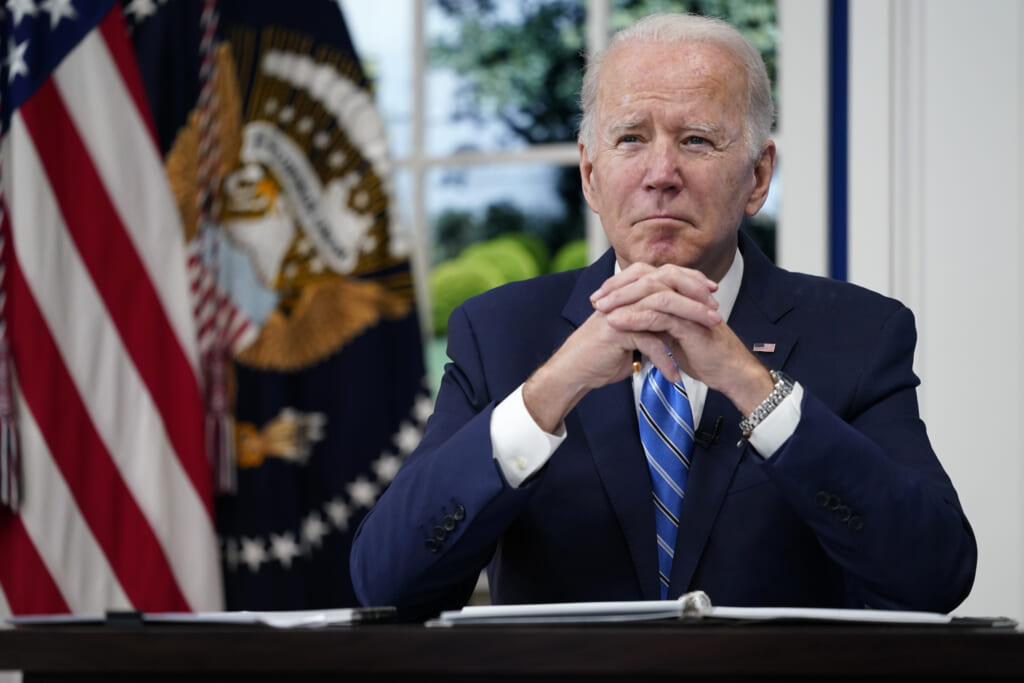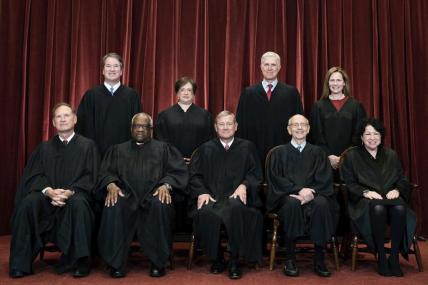Advocacy groups stand with Biden’s pledge to nominate nation’s first Black woman on Supreme Court
Early into the 2020 presidential campaign, Biden said that he looked forward “to making sure there's a Black woman on the Supreme Court”
A White House source tells theGrio that conversations are being had over possibilities to fill the soon-to-be vacant Supreme Court seat after reports on Wednesday indicated that Justice Stephen Breyer is retiring after serving on the High Court for nearly three decades.
Breyer has yet to confirm his retirement. However, White House Press Secretary Jen Psaki tweeted, “It has always been the decision of any Supreme Court Justice if and when they decide to retire, and how they want to announce it, and that remains the case today. We have no additional details or information to share from @WhiteHouse.”
Early into the 2020 presidential campaign in February during the Democratic primary, then-candidate Joe Biden said that he looked forward “to making sure there’s a Black woman on the Supreme Court” if he were elected president. Now, that promise will become a reality, as Psaki affirmed during Wednesday’s press briefing: “The president has stated and reiterated his commitment to nominating a Black woman to the Supreme Court, and certainly stands by that.”

Following reports of Breyer’s retirement, there were immediate calls from elected officials and advocacy groups in support of what will be a historic nomination.
“Never in our nation’s history has a Black woman served on the Supreme Court. It’s long past time we change that,” tweeted freshman U.S. Rep. Mondaire Jones of New York, who sits on the House Judiciary Committee and was the first member of Congress to call on Breyer to retire.
“In his first year, @POTUS has shown a commitment to nominating jurists who reflect the diversity of America. We need him to extend that commitment to the High Court,” added Jones.
Congressman Bobby Rush of Illinois tweeted, “Thrilled that @POTUS will have the chance to make good on his promise to nominate a Black woman to the Supreme Court.”
The quest for a Black woman to sit on the United States Supreme Court became louder during former President Barack Obama’s administration. Women’s groups pushed the idea before President Obama ultimately nominated Merrick Garland to the court. Republicans, led by then-Senate Majority Leader Mitch McConnell, prevented that nomination from moving forward. Republicans cited timing as their reason not to consider Obama’s nominee.
But, today, President Biden will finally get his chance to install a new justice.

April Reign, the co-founder of Sista SCOTUS, told theGrio that immediately following the news reports of Breyer’s impending resignation, “President Biden has shown leadership…in this instance and in nominating Black women throughout the federal judiciary, and we’re very appreciative of that.”
There is a field of qualified Black women that have a pedigree to fill the job. Some of those names on Reign’s list are thought to be on the president’s short list as well. These names include United States circuit judge at the Court of Appeals for the District of Columbia, Ketanji Brown Jackson, who served as a former law clerk for Justice Breyer and Sherrilyn Ifill, the outgoing head of the NAACP Legal Defense Fund.
”The concern here is that not every person who would make a great Supreme Court justice needs to be someone who’s practiced in a courtroom, or needs to be a person who went to an Ivy League law school because again and again, we’ve seen that those attributes are not necessarily accurate predictors of just and balanced rulings—based on justices that we’ve seen on the Supreme Court in the past,” said Reign.
However, she believes there will be an automatic pushback just because of the historic nature of the nominee being a Black woman.
The nation’s oldest civil rights organization, The NAACP, saluted Justice Breyer for some of his decisions on the court in some landmark rights cases but wrote in a statement, “Our Supreme Court desperately requires balance. The Court was already predisposed against civil rights. Then Donald Trump, aided by the Senate which broke all traditions and customs, installed three justices who have taken it in an extreme direction that threatens our civil rights for a lifetime.”

The rights group offered a mandate in the statement and said, “It is time to restore the integrity and legitimacy of the Court and its role as protector of civil rights. Too much lies in the balance, on voting rights, equal educational opportunity and reproductive choice.”
Cheri Beasley, candidate for U.S Senate in North Carolina and former Chief of Justice of the State of North Carolina affirms the NAACP stance on a diverse court.
“The diversity really does matter… we’ve had two African Americans to serve on the United States Supreme Court and we’ve never had an African American woman to serve. It is time,” said Beasley.
“Diversity means and representation means, frankly, for all the decisions that the US Supreme Court makes, it matters that those who are in service have a real appreciation and understanding of the law and the impact of those laws and the Constitution, and the impact of those decisions on people’s everyday lives.”
Like any other high-profile nomination, this could be an uphill battle, depending who is nominated.
“We expect to see Vice President Kamala Harris absolutely talking to members of Congress and whipping them into support of President Biden’s nomination,” said Reign.

The community will also likely have political impact as a groundswell of support and petitions could sway a decision on a Senate confirmation vote.
Representation at some of the highest levels is a key factor for a lot of people when discussing a potential nomination. “Representation means that the next U.S. Supreme Court justice will have shared lived experiences around personal experiences, professional experiences and really have a sense of engagement around the law in so many diverse ways in which it impacts so many people around this country to include African-Americans,” said Senate candidate Beasley.
Since the initial impact of COVID-19, the #SheWillRise effort has grown to create history with a Black woman nominated to the United States Supreme Court.
“A Black woman being nominated to the Supreme Court is important for several reasons. Number one, we should talk about representation, but you can’t be what you can’t see,” said Reign.
“There are hundreds of thousands of little girls of color who may aspire to being a justice and not realize that this is an opportunity for them.”
Have you subscribed to the Grio podcasts, ‘Dear Culture’ or Acting Up? Download our newest episodes now! TheGrio is now on Apple TV, Amazon Fire, and Roku. Download theGrio today!


